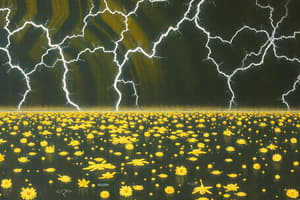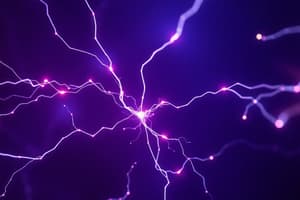Podcast
Questions and Answers
What is the phenomenon that occurs when a conductive material is used to block the effects of an electric field on a sensitive device?
What is the phenomenon that occurs when a conductive material is used to block the effects of an electric field on a sensitive device?
- Electrostatic Shielding (correct)
- Van der Waals Forces
- Coulomb's Law
- Electric Dipole Moment
What is the weakest type of intermolecular forces caused by the temporary separation and fluctuation of electron clouds around atoms or molecules?
What is the weakest type of intermolecular forces caused by the temporary separation and fluctuation of electron clouds around atoms or molecules?
- Van der Waals Forces (correct)
- Electrostatic Shielding
- Coulomb's Law
- Electric Dipole Moment
What does Coulomb's Law describe?
What does Coulomb's Law describe?
- Phenomenon of electrostatic shielding
- Force between two point charges in a vacuum (correct)
- Weakest type of intermolecular forces
- Effect of electric field on non-conducting objects
What are electrostatic systems characterized by?
What are electrostatic systems characterized by?
What can create electric fields in addition to conducting objects?
What can create electric fields in addition to conducting objects?
What is the fundamental aspect of the behavior of many materials and phenomena in nature and technology?
What is the fundamental aspect of the behavior of many materials and phenomena in nature and technology?
Which type of electric charges attract each other?
Which type of electric charges attract each other?
What causes forces on matter when other charged matter is nearby?
What causes forces on matter when other charged matter is nearby?
What are the two types of electric charges?
What are the two types of electric charges?
What do electric field lines originate from and terminate at?
What do electric field lines originate from and terminate at?
Flashcards are hidden until you start studying
Study Notes
Introduction to Electrostatics
Electrostatics is a branch of physics that deals with the study of electric charges and their interactions. It is a fundamental aspect of the behavior of many materials and phenomena in nature and technology, such as electricity generation, electric fields, and electrostatic discharge. In this article, we will explore the concepts of electrostatics, including electric charge, electric fields, and electrostatic systems, providing a comprehensive understanding of the subject.
Electric Charge
Electric charge is a physical property of matter that causes it to experience forces when other charged matter is nearby. There are two types of electric charges: positive and negative. Opposite charges attract each other, while like charges repel each other. Electric charges can accumulate on the surface of conductors or insulators, and they can be transferred from one object to another through contact, induction, or electromagnetic fields.
Electric Fields
An electric field is a region around an electric charge where other charges experience a force due to their proximity to the original charge. Electric fields are represented by electric field lines, which originate from positive charges and terminate at negative charges. The density of the lines indicates the strength of the field, with more lines indicating a stronger field. Electric fields can also be created by non-conducting objects with a permanent dipole moment, such as a molecule with a positive and negative pole.
Electrostatic Systems
An electrostatic system is a collection of electric charges or conductors in an electric field. These systems can be characterized by their equilibrium configurations, which are typically determined by the balance between the repulsive and attractive forces between the charges. Examples of electrostatic systems include:
-
Coulomb's Law: This law describes the force between two point charges in a vacuum. It states that the force between two charges is directly proportional to the product of their charges and inversely proportional to the square of the distance between them.
-
Electrostatic Shielding: This phenomenon occurs when a conductive material is used to block the effects of an electric field on a sensitive device. The charges on the shielded device are redistributed to the outer surface of the material, effectively cancelling out the external field.
-
Van der Waals Forces: These forces are the weakest type of intermolecular forces and are caused by the temporary separation and fluctuation of electron clouds around atoms or molecules. They play a significant role in the behavior of electrostatic systems.
Conclusion
Electrostatics is a crucial field of study that provides insights into the behavior of electric charges and their interactions. By understanding the concepts of electric charge, electric fields, and electrostatic systems, we can better grasp the principles behind various phenomena and applications in nature and technology. Whether it's generating electricity, designing electrostatic shielding, or studying the fundamental properties of matter, the study of electrostatics is essential for a wide range of fields and applications.
Studying That Suits You
Use AI to generate personalized quizzes and flashcards to suit your learning preferences.




